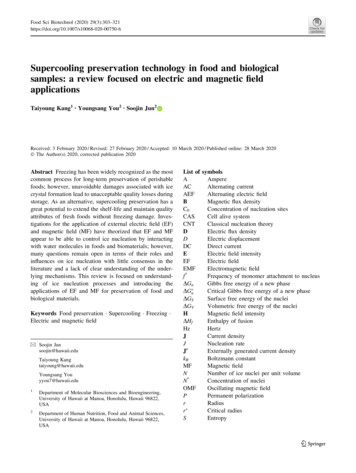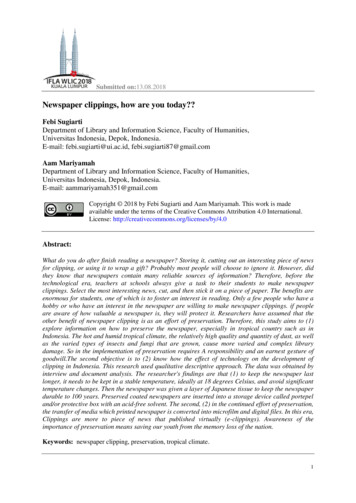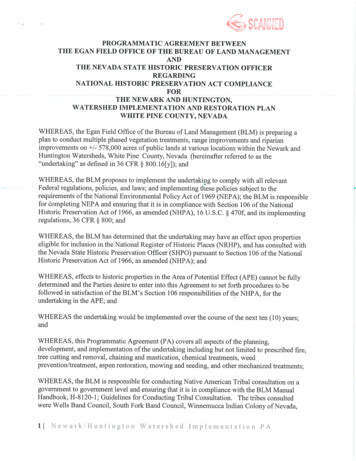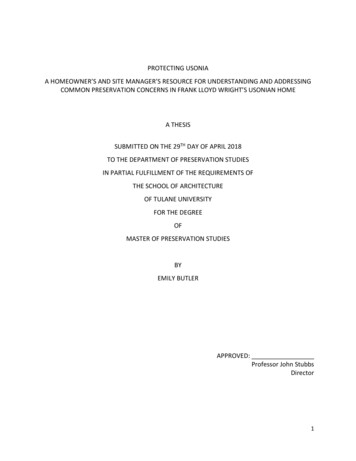
Transcription
GUIDE TOWEALTHPRESERVATIONMAY 2019PLACE YOUR FUTURE IN EXPERIENCED HANDS
GUIDE TO WEALTH PRESERVATION02GUIDE TOWEALTHPRESERVATIONPlace your future in experienced handsWELCOMEWelcome to our Guide to Wealth Preservation.Our advice can help you preserve and protectthe wealth you’ve amassed through hard work,inheritance or good fortune. Inside our guide,we look at the number of key areas that willenable you to put in place an effective protectionplanning strategy to preserve and protect yourwealth for you and future generations.We understand that peace of mind for thefuture is essential. You’ve worked hard to buildand grow your wealth; it’s only natural to put inplace measures to protect it. But unforeseen lifeevents and circumstances can potentially impactyour finances in a number of ways. We can helpyou to safeguard your wealth today and for futuregenerations and organise it to support your needsand goals.No matter what the current economicenvironment, adhering to a few sound andwell-practiced strategies will help you to preparefor the future. While your individual situationwill always have its unique qualities, our Guideto Wealth Preservation provides suggestionsto consider as you review your own and yourfamily’s protection plans.Financial protection benefits have becomemore important as financial foundations haveshifted, government resources have been strainedand costs have climbed. When people need themmost, benefits such as disability, accident, criticalillness and life insurance protect against financialhardships that can derail their stability.Being prepared for the unexpected willprotect you and your family from sudden andlong-term financial hardship. It goes withoutsaying that we need to enjoy our wealth today,but at the same time ensure it remains there forus and our family tomorrow. nUNDERSTANDINGYOUR NEEDSIt’s not easy to think abouthow you would secure yourfamily’s future if you were nolonger around. But having aneffective protection planningstrategy in place prepares forevery possibility. To review yourcurrent situation or if you haveany concerns, please contact us –don’t leave it to chance.
03GUIDE TO WEALTH PRESERVATIONCONTENTS02 WELCOMEPlace your future inexperienced hands04 LIFE INSURANCEProviding a financial safetynet for your loved ones06 LIFE INSURANCE OPTIONSWhen it comes to your life insurance,you’ve got options10 CRITICAL ILLNESS COVERMinimising the financial impact on youand your loved ones12 INCOME PROTECTIONINSURANCECover for you and your family finances14 PRIVATE MEDICAL INSURANCEHealthcare when you need it16 LONG-TERM CARE INSURANCE07 TERM LIFE INSURANCEOne of the pillars of financial protection08 WHOLE-OF-LIFE INSURANCEGuaranteed tax-free paymentwhenever you dieMeeting the cost of residentialand nursing care in old age18 MAKING A WILLContinuing your support longinto the future20 LASTING POWER OF ATTORNEYMaking decisions on your behalfduring your lifetime22 INHERITANCE TAXPassing assets efficiently tothe next generation24 TRUSTSProtecting, preserving or ultimatelydistributing wealth
GUIDE TO WEALTH PRESERVATION04LIFE INSURANCEProviding a financial safety net for your loved onesWe would rather not think of the timewhen we're no longer around. Butit's important to protect the thingsthat really matter – like our loved ones, homeand lifestyle – in case the unexpected happens.Life insurance (sometimes called ‘life cover’) isall about making sure your dependants have themoney they need if you were no longer around. Itsmost important function is to replace the earningsthat would cease at the death of the insured.Losing your current and future incomeIf you die during your earning years, yourfamily could suffer a severe economic lossas a result of losing your current and futureincome. Unfortunately, your family would stillhave to pay its regular bills, the mortgage andoutstanding debts, and perhaps even continuesaving for university and retirement.Unless you're independently wealthy,achieving these goals may be virtuallyimpossible for your family with the loss of yoursteady income. Life insurance offers a way foryour family to continue living comfortably andwithout worry.Helps you to financiallyprotect your familyWe insure our cars, homes and even ourmobile phones – so it goes without sayingthat we should also be insured for our fullreplacement value to ensure that our loved onesare financially catered for in the event of ourpremature death.Life insurance helps you to financially protectyour family. It could pay out a cash sum if youdie while covered by the policy. You choose theamount of life cover you need and how longyou need it for, and you can pay your premiumsmonthly or annually.Coping financially duringan otherwise difficult timeLife insurance provides a safety net for yourfamily and loved ones if you die, helping themcope financially during an otherwise difficulttime. Ultimately, it offers reassurance that yourfamily would be protected financially should theworst happen.We never know what life has in store for us, soit’s important to get the right life insurance policy.A good place to start is asking yourself threequestions: what do I need to protect? How muchcover do I need? How long will I need cover for?This sum must take into account their livingcosts, as well as any outstanding liabilities, such asa mortgage.Obtaining the right advice andknowing which option to chooseIt may be the case that not everyone needs lifeinsurance. But if your spouse and children,partner, or other relatives depend on your incometo cover the mortgage or other living expenses,then it will be something you should consider.Life insurance makes sure they're taken careof financially if you die. So whether you'relooking to provide a financial safety net for yourloved ones, moving house or a first-time buyerlooking to arrange your mortgage life insurance– or simply wanting to add some cover to whatyou've already got – you'll want to make sureyou choose the right type of cover. That's whyobtaining the right advice and knowing whichoption to choose – including the most suitablesum assured, premium, terms and paymentprovisions – is essential.Reaching different stages in your lifethat require protectionThe appropriate level of life insurance willenable your dependants to cope financially inthe event of your premature death. When youtake out life insurance, you set the amount youwant the policy to pay out should you die – thisis called the ‘sum assured’. Even if you considerthat currently you have sufficient life assurance,you’ll probably need more later on if yourcircumstances change. If you don’t update yourpolicy as key events happen throughout yourlife, you may risk being seriously under-insured.As you reach different stages in your life, theneed for protection will inevitably change. Howmuch life insurance you need really dependson your circumstances – for example, whetheryou’ve got a mortgage, you’re single or havechildren. Before you compare life insurance, it'sworth bearing in mind that the amount of coveryou need will very much depend on your ownpersonal circumstances, such as the needs ofyour family and dependants.What you need to ask yourself:n Who are your financial dependants – yourhusband or wife, registered civil partner,children, brother, sister, or parents?n What kind of financial support does yourfamily have now?n What kind of financial support will yourfamily need in the future?n What kind of costs will need to be covered,such as household bills, living expenses,mortgage payments, education costs, debts orloans, or funeral costs?There is no one-size-fits-all solution, and theamount of cover – as well as how long it lasts for– will vary from person to person.These are some events when you shouldconsider reviewing your life insurancerequirements:n Buying your first home with a partnern Covering loansn Getting married or entering into a registeredcivil partnershipn Starting a familyn Becoming a stay-at-home parentn Having more childrenn Moving to a bigger propertyn Salary increasesn Changing your jobn Reaching retirement
05GUIDE TO WEALTH PRESERVATIONn Relying on someone else to support youn Personal guarantee for business loansEnable loved ones to maintain theircurrent standard of livingThe price you pay for a life insurance policydepends on a number of things. These includethe amount of money you want to cover andthe length of the policy, but also your age, yourhealth, your lifestyle and whether you smoke.If you have a spouse, partner or children,you should have sufficient protection to pay offyour mortgage and any other liabilities. Afterthat, you may need life insurance to replace atleast some of your income. How much moneya family needs will vary from household tohousehold, so ultimately it's up to you to decidehow much money you would like to leave yourfamily that would enable them to maintain theircurrent standard of living.Types of life insuranceThere are two basic types of life insurance:‘term life’ and ‘whole-of-life’. But within thosecategories, there are different variations.The cheapest, simplest form of life insuranceis term life insurance. It is straightforwardprotection – there is no investment element,and it pays out a lump sum if you die withina specified period. There are several types ofterm insurance.The other type of protection available is awhole-of-life insurance policy, designed toprovide you with cover throughout your entirelifetime. The policy only pays out once thepolicyholder dies, providing the policyholder’sdependants with a lump sum, usually taxfree. Depending on the individual policy,policyholders may have to continue contributingright up until they die, or they may be able tostop paying in once they reach a stated age, eventhough the cover continues until they die.Clarify what you wantthe life insurance to protectGenerally speaking, the amount of life insuranceyou may need should provide a lump sum that issufficient to remove the burden of any debts and,ideally, leave enough over to invest in order toprovide an income to support your dependantsfor the required period of time.The first consideration is to clarify what youwant the life insurance to protect. If you simplywant to cover your mortgage, then an amountequal to the outstanding mortgage debt canachieve that.To prevent your family from being financiallydisadvantaged by your premature death, and toprovide enough financial support to maintaintheir current lifestyle, there are a few morevariables you should consider:n What are your family expenses, and howwould they change if you died?n How much would the family expenditureincrease on requirements such as childcareif you were to die?n How much would your family income dropif you were to die?n How much cover do you receive from youremployer or company pension scheme, andfor how long?n What existing policies do you havealready, and how far do they go to meetingyour needs?n How long would your existing savings last?n What state benefits are there that couldprovide extra support to meet yourfamily’s needs?n How would the return of inflation to theeconomy affect the amount of your coverover time?THE PLAN WILL HAVE NO CASH INVALUE AT ANY TIME AND WILL CEASEAT THE END OF THE TERM. IF PREMIUMSARE NOT MAINTAINED, THEN COVERWILL LAPSE.
GUIDE TO WEALTH PRESERVATION06LIFE INSURANCE OPTIONSWhen it comes to your life insurance, you’ve got optionsIf you want to continue to make sure your familyare looked after in the event of your prematuredeath, then you should consider your life insuranceoptions. Life is complicated and can be unpredictable, soit’s important that you assess which different types of lifeinsurance match your requirements.‘Single life’ policies cover just one person. A ‘jointlife’ policy covers two people, and when one person onthe policy dies, the money is paid out and the policyends. You will need to decide whether the joint policypays out on first or second death, as this will determinewhen the policy ends.When choosing between these options, think about:n Affordability – a joint life policy is usually moreaffordable than two separate single policiesn Cover needs – do you both have the same lifeinsurance needs, or would separate policies withdifferent levels of cover be more appropriate?n Work benefits – if one of you has work ‘death inservice’ benefit, you might only need one plann Health – if your joint policy is with someone inpoor health, this may increase yourmonthly payments
07GUIDE TO WEALTH PRESERVATIONTERM LIFE INSURANCEOne of the pillars of financial protectionWith term life insurance, you choosethe amount you want to be insuredfor and the period for which youwant cover. This is the most basic type of lifeinsurance. This can range from as few as five toas many as 30 years, but a typical period for aterm policy is ten years.If you die within the term, the policy pays outto your beneficiaries. A term policy is straightinsurance with no investment component.There are two main types of term lifeinsurance to consider: level-term anddecreasing-term life insurance.Level-term life insurance policiesA level-term policy pays out a lump sum ifyou die within the specified term. The amountyou’re covered for remains level throughout theterm – hence the name. The monthly or annualpremiums you pay usually stay the same, too.Level-term policies can be a good option forfamily protection, where you want to leave alump sum that your family can invest to live onafter you’ve gone. It can also be a good optionif you need a specified amount of cover for acertain length of time, for example, to cover aninterest-only mortgage that’s not covered byan endowment policy.Decreasing-term life insurance policiesWith a decreasing-term policy, the amountyou’re covered for decreases over the termof the policy. These policies are often used tocover a debt that reduces over time, such as arepayment mortgage.Premiums are usually cheaper than for levelterm cover, as the amount insured reducesas time goes on. Decreasing-term assurancepolicies can also be used for Inheritance Taxplanning purposes.Family income benefit policiesFamily income benefit life assurance is a typeof decreasing term policy. Instead of a lumpsum, though, it pays out a regular income toyour beneficiaries until the policy’s expiry dateif you die.You can arrange for the same amount ofyour take-home income to be paid out to yourfamily if you die. nIF YOU DIE WITHINTHE TERM, THEPOLICY PAYS OUT TOYOUR BENEFICIARIES.A TERM POLICY ISSTRAIGHT INSURANCEWITH NO INVESTMENTCOMPONENT.THE PLAN WILL HAVE NO CASH INVALUE AT ANY TIME AND WILL CEASEAT THE END OF THE TERM. IF PREMIUMSARE NOT MAINTAINED, THEN COVERWILL LAPSE.
GUIDE TO WEALTH PRESERVATION08WHOLE-OF-LIFEINSURANCEGuaranteed tax-free payment whenever you dieWHOLE-OF-LIFE POLICIES TEND TOOFFER THE POLICYHOLDER LIFELONGPROTECTION AND ARE DESIGNED TOGIVE YOU A SPECIFIED AMOUNT OFCOVER FOR THE WHOLE OF YOUR LIFEAND PAYS OUT WHEN YOU DIE.Whole-of-life policies tend to offer thepolicyholder lifelong protection and aredesigned to give you a specified amountof cover for the whole of your life and pays out whenyou die.Because it's guaranteed that you'll die at some point(and therefore that the policy will have to pay out),these policies are more expensive than term insurancepolicies, which only pay out if you die within a certaintime frame.Paying Inheritance TaxWhole-of-life insurance policies can be a useful wayto cover a future Inheritance Tax bill. If you thinkyour estate will have to pay Inheritance Tax when
09GUIDE TO WEALTH PRESERVATIONyou die, you could set up a whole-of-life insurance policy to coverthe tax due, meaning that more is passed to your beneficiaries. Toensure the proceeds of the life insurance policy are not includedin your estate, though, it is vital that the policy be written in anappropriate trust. This is a very specialist area of estate planning, andyou should obtain professional financial advice.A whole-of-life insurance policy has a double benefit: not only arethe proceeds of the policy outside your estate for Inheritance Taxpurposes, but the premium paid for the policy will reduce the valueof your estate while you're alive, further reducing your estate's futureInheritance Tax bill.Different types of policyThere are different types of whole-of-life insurance – some offer aset payout from the outset, others are linked to investments, and thepayout will depend on performance. Investment-linked policies areeither unit-linked policies, linked to funds or with-profits policieswhich offer bonuses.Some whole-of-life policies require that premiums are paid all theway up to your death. Others become paid-up at a certain age and waivepremiums from that point onwards.Whole-of-life policies (but not all) have an investment element andtherefore a surrender value. If, however, you cancel the policy and cash itin, you will lose your cover. Where there is an investment element, yourpremiums are usually reviewed after ten years, and then every five years.Whole-of-life policies are also available without an investmentelement and with guaranteed or investment-linked premiums fromsome providers.ReviewsThe level of protection selected will normally be guaranteed for thefirst ten years, at which point it will be reviewed to see how muchprotection can be provided in the future. If the review shows that thesame level of protection can be carried on, it will be guaranteed tothe next review date.If the review reveals that the same level of protection can’t continue,you’ll have two choices:n Increase your paymentsn Keep your payments the same and reduce your level of protectionMaximum coverMaximum cover offers a high initial level of cover for a lower premiumuntil the first plan review, which is normally after ten years. The lowpremium is achieved because very little of your premium is kept backfor investment, as most of it is used to pay for the life insurance.After a review, you may have to increase your premiums significantlyto keep the same level of cover, as this depends on how well the cash inthe investment reserve (underlying fund) has performed.Standard coverThis cover balances the level of life insurance with adequateinvestment to support the policy in later years. This maintains theoriginal premium throughout the life of the policy. However, it relieson the value of units invested in the underlying fund growing at acertain level each year. Increased charges or poor performance of thefund could mean you’ll have to increase your monthly premium tokeep the same level of cover. nTHE VALUE OF INVESTMENTS AND THE INCOME FROMTHEM MAY GO DOWN. YOU MAY NOT GET BACK THEORIGINAL AMOUNT INVESTED.
GUIDE TO WEALTH PRESERVATION10CRITICAL ILLNESS COVERMinimising the financial impact on you and your loved onesWhat would life be like if youwere diagnosed with a seriousillness? Things could change verysuddenly. You’d get your family together andtell them what was going on. Before long,you’d start spending time in hospital fortreatment. You may also need to take sometime off.It’s hard to know what the financial impactof all this would be for you and the people whodepend on you. Any of us can become ill at anyage – and with appropriate critical illness coverin place, it could help to give some financialsecurity at a difficult time.Critical illness cover can help to minimise thefinancial impact on you and your loved ones.For example, if you needed to give up work torecover, or if you passed away during the lengthof the policy, the money could be used to helpfund the mortgage or rent, everyday bills, oreven simple things like the weekly food shop– giving you and/or your family some peace ofmind when you need it most.Surviving a serious illnessAfter surviving a critical illness, sufferers maynot be able to return to work straight away (orever), or may need home modifications or privatetherapeutic care. It is sad to contemplate a situationwhere someone survives a serious illness butfails to survive the ensuing financial hardship.Preparing for the worst is not something we wantto think about when feeling fit and healthy, but younever know what life is going to throw at you next.Tax-free lump sumCritical illness cover, either on its own or as partof a life insurance policy, is designed to pay youa tax-free lump sum on the diagnosis of certainspecified life-threatening or debilitating (butnot necessarily fatal) conditions, such as a heartattack, stroke, certain types/stages of cancer andmultiple sclerosis.A more comprehensive policy will covermany more serious conditions, including lossof sight, permanent loss of hearing, and a totaland permanent disability that stops you fromworking. Some policies also provide coveragainst the loss of limbs. But not all conditionsare necessarily covered, which is why you shouldalways obtain professional financial advice.Much-needed financial supportIf you are single with no dependants, criticalillness cover can be used to pay off yourmortgage, which means that you would havefewer bills or a lump sum to use if you becamevery unwell. And if you are part of a couple, itcan provide much-needed financial support at atime of emotional stress.Exclusions and limitationsThe illnesses covered are specified in thepolicy along with any exclusions andlimitations, which may differ betweeninsurers. Critical illness policies usually onlypay out once, so they are not a replacementfor income. Some policies offer combined lifeand critical illness cover. These pay out if youare diagnosed with a critical illness, or you die– whichever happens first.Pre-existing conditionsIf you already have an existing critical illnesspolicy, you might find that by replacing apolicy, you would lose some of the benefitsif you have developed any illnesses since youtook out the first policy. It is important toseek professional advice before consideringreplacing or switching your policy, as preexisting conditions may not be covered undera new policy.Lifestyle changesSome policies allow you to increase yourcover, particularly after lifestyle changessuch as marriage, moving home or havingchildren. If you cannot increase the coverunder your existing policy, you couldconsider taking out a new policy just to 'topup' your existing cover.
11GUIDE TO WEALTH PRESERVATIONDefined conditionsA policy will provide cover only for conditionsdefined in the policy document. For a conditionto be covered, your condition must meet thepolicy definition exactly. This can mean thatsome conditions, such as some forms of cancer,won't be covered if deemed insufficientlysevere. Similarly, some conditions may not becovered if you suffer from them after reachinga certain age – for example, many policies willnot cover Alzheimer's disease if diagnosed afterthe age of 60.Survival periodVery few policies will pay out as soonas you receive diagnosis of any of theconditions listed in the policy, and mostpay out only after a ‘survival period.’ Thismeans that if you die within this period(even if you meet the definition of thecritical illness given in the policy), thecover would not pay out.Range of factorsHow much you pay for critical illness cover willdepend on a range of factors, including whatsort of policy you have chosen, your age, theamount you want the policy to pay out, andwhether or not you smoke.Permanent total disability is usuallyincluded in the policy. Some insurers define‘permanent total disability’ as being unableto work as you normally would as a resultof sickness, while others see it as beingunable to independently perform three ormore ‘Activities of Daily Living’ as a result ofsickness or accident.Activities of daily living include:nnnnBathingDressing and undressingEatingTransferring from bed to chair and backagainMake sure you’re fully coveredThe good news is that medical advances meanmore people than ever are surviving conditionsthat might have killed earlier generations.Critical illness cover can provide cash to allowyou to pursue a less stressful lifestyle while yourecover from illness, or you can use it for anyother purpose. Don’t leave it to chance – makesure you’re fully covered. nIF THE POLICY HAS NO INVESTMENTELEMENT THEN IT WILL HAVE NOCASH IN VALUE AT ANY TIME ANDWILL CEASE AT THE END OF THE TERM.IF PREMIUMS ARE NOT MAINTAINED,THEN COVER WILL LAPSE.CRITICAL ILLNESS PLANS MAY NOTCOVER ALL THE DEFINITIONS OF ACRITICAL ILLNESS. THE DEFINITIONSVARY BETWEEN PRODUCT PROVIDERSAND WILL BE DESCRIBED IN THE KEYFEATURES AND POLICY DOCUMENT IFYOU GO AHEAD WITH A PLAN.
GUIDE TO WEALTH PRESERVATION12INCOME PROTECTIONINSURANCECover for you and your family financesIt’s important to be able to keep your financeshealthy as you recover from an illness or injury.Being unable to work can quickly turn your worldupside down. No one likes to think that something badwill happen to them, but if you couldn’t work due toa serious illness, how would you manage financially?Could you survive on savings or sick pay from work?If not, you may need some other way to keep payingthe bills – and you might want to consider incomeprotection insurance.You might think this may not happen to you, andof course we hope it doesn’t, but it’s important torecognise that no one is immune to the risk of illnessand accidents. No one can guarantee that they willnot be the victim of an unfortunate accident or bediagnosed with a serious illness. This won’t stop thebills arriving or the mortgage payments from beingdeducted from your bank account, so going withoutincome protection insurance could be tempting fate.Providing monthly paymentsIncome protection insurance is a long-term insurancepolicy that provides a monthly payment if you can’twork because you’re ill or injured, and typically paysout until you can start working again, or until youretire, die or the end of the policy term – whicheveris sooner.Keep your finances healthy as you recover fromillness or injury:n Replaces part of your income if you becomeill or disabledn It pays out until you can start working again, oruntil you retire, die or the end of the policy term –whichever is soonern There’s a waiting period before the payments start,so you generally set payments to start after yoursick pay ends, or after any other insurance stopscovering you. The longer you wait, the lower themonthly paymentsn It covers most illnesses that leave you unable towork, either in the short or long term (dependingon the type of policy and its definition ofincapacity)n You can claim as many times as you need to whilethe policy is in force
13GUIDE TO WEALTH PRESERVATIONGenerous sickness benefitsWhen you suffer a serious illness or injury, the last thing you should worryabout is how you’ll pay the bills while you’re off work. After all, what ifyour sick pay should run out while you’re still recovering?Some people may receive generous sickness benefits through theirworkplace, and these can extend right up until the date upon which theyhad intended to retire. However, some employees with long-term healthproblems could, on the other hand, find themselves having to rely on thestate, which is likely to prove hard.Tax-free monthly incomeWithout a regular income, you may find it a struggle financially, evenif you were ill for only a short period, and you could end up using yoursavings to pay the bills. In the event that you suffered from a seriousillness, medical condition or accident, you could even find that you arenever able to return to work.Few of us could cope financially if we were off work for more than sixto nine months. Income protection insurance provides a tax-free monthlyincome for as long as required, up to retirement age, should you be unableto work due to long-term sickness or injury.Profiting from misfortuneIncome protection insurance aims to put you back to the position youwere in before you were unable to work. It does not allow you to make aprofit out of your misfortune. So the maximum amount of income youcan replace through insurance is broadly the after-tax earnings you havelost, less an adjustment for state benefits you can claim.This is typically translated into a percentage of your salary beforetax, but the actual amount will depend on the company that providesyour cover. It is advisable to talk to your employer about whether theyprovide this company benefit and to understand the support servicesavailable to you.Self-employmentIf you are self-employed, then no work is also likely to mean no income.However, depending on what you do, you may have income coming infrom earlier work, even if you are ill for several months. The self-employedcan take out individual policies rather than business ones, but you need toascertain on what basis the insurer will pay out.A typical basis for payment is your pre-tax share of the gross profit,after deduction of trading expenses, in the 12 months immediately priorto the date of your incapacity. Some policies operate an average over thelast three years, as they understand that self-employed people often have afluctuating income.Cost of coverThe cost of your cover will depend on your gender, occupation,age, state of health and whether or not you smoke. The ‘occupationclass’ is used by insurers to decide whether a policyholder is ableto return to work. If a policy will pay out only if a policyholder isunable to work in ‘any occupation’, it might not pay benefits for long– or indeed at all. The most comprehensive definitions are ‘OwnOccupation’ or ‘Suited Occupation’. ‘Own Occupation’ means you canmake a claim if you are unable to perform your own job. However,being covered under ‘Any Occupation’ means that you have to beunable to perform any job, with equivalent earnings to the job youwere doing before not taken into account.You can also usually choose for your cover to remain the same (levelcover) or increase in line with inflation (inflation-linked cover):n Level cover – with this cover, if you made a claim, the monthlyincome would be fi
Welcome to our Guide to Wealth Preservation . Our advice can help you preserve and protect the wealth you’ve amassed through hard work, inheritance or good fortune. Inside our guide, we look at the number of key areas that will enable you to put in place an e!ective protection planning strategy to preserve










